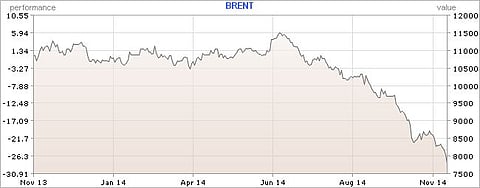Oil price rallies as punters expect OPEC to cut supply, lift price
Nov. 17 (Bloomberg) — Speculators got more bullish on oil for the first time in three weeks, judging that a slump in prices to a four-year low will force OPEC to act.
The net-long position in West Texas Intermediate rose 8.7 percent in the week ended Nov. 11, U.S. Commodity Futures Trading Commission data show. Long holdings rebounded from the lowest level in 17 months while short bets contracted.
WTI tumbled 29 percent since June as U.S. output climbed to three-decade high, adding to a global supply glut at a time when the International Energy Agency says demand growth is slowing. Ministers from the Organization of Petroleum Exporting Countries accelerated diplomatic visits last week, potentially seeking a consensus before the group's Nov. 27 meeting in Vienna.
"The market is under incredible pressure and it will stay that way until OPEC takes decisive action," Rob Haworth, a senior investment strategist in Seattle at U.S. Bank Wealth Management which oversees about $120 billion, said by phone Nov. 13. "There has to be something that changes the story, which is that there's too much supply."
WTI advanced 1 percent to $77.94 a barrel on the New York Mercantile Exchange in the period covered by the CFTC report. The contract lost 33 cents, or 0.4 percent, to $75.49 at 11:57 a.m. Singapore time. Brent oil fell 42 cents to $78.99.
Ministerial Travel
Libyan Prime Minister Abdullah al-Thani flew to Saudi Arabia on Nov. 13 just as Iraqi President Fouad Masoum left after a two-day visit, the Saudi Press Agency reported. Rafael Ramirez, Venezuela's foreign minister and representative to OPEC, held talks in Algeria and Qatar while Saudi Oil Minister Ali Al-Naimi toured Latin America.
OPEC last cut quotas in December 2008, trimming its target by 2.46 million barrels a day in response to the financial crash that sent WTI tumbling from a record $147.27 in July 2008 to $32.40 in December of the same year. OPEC produced 30.97 million barrels daily last month, data compiled by Bloomberg show.
"The lower the price falls, the greater the pressure on OPEC to announce an output reduction," Tim Evans, an energy analyst at Citi Futures Perspective in New York, said by phone Nov. 14.
IEA Outlook
Prices may slide further in coming months as demand slips by about 1 percent to 92.6 million barrels a day in the first quarter from this quarter, the IEA said Nov. 14. The IEA estimates that consumption grew in 2014 at the slowest pace in five years.
U.S. daily crude output climbed to 9.06 million barrels in the week ended Nov. 7, the most in weekly Energy Information Administration data that began in 1983.
"It's possible that even with an OPEC production cut there won't be an immediate increase in prices," Evans said. "It sometimes takes time for the supertanker that is the oil market to switch direction."
ETF investors also boosted bets on rising prices. The four biggest U.S. exchange-traded funds tied to oil had 70.5 million shares outstanding as of Nov. 12, the most since May 2013, according to exchange data compiled by Bloomberg.
The net-long position in WTI rose by 14,584 to 182,490 futures and options in the week ended Nov. 11, still down 49 percent from the peak in June. Long positions climbed 1 percent and short positions fell 15 percent.
Gasoline Wagers
In other markets, bullish bets on gasoline increased 5.8 percent to 32,362 contracts, the most since August. Futures advanced 1.2 percent to $2.1036 a gallon on Nymex in the reporting period.
Retail gasoline, averaged nationwide, slid to $2.893 a gallon Nov. 15, the lowest since Dec. 1, 2010, according to Heathrow, Florida-based AAA, the largest U.S. motoring group.
Bearish wagers on U.S. ultra low sulfur diesel decreased 5.2 percent to 29,128 contracts. The fuel climbed 1.1 percent to $2.4687 a gallon in the report week.
Net-long wagers on U.S. natural gas advanced 53 percent to 88,238 lots, the highest since the week ended Sept. 30. The measure includes an index of four contracts adjusted to futures equivalents: Nymex natural gas futures, Nymex Henry Hub Swap Futures, Nymex ClearPort Henry Hub Penultimate Swaps and the ICE Futures U.S. Henry Hub contract.
Nymex natural gas rose 11.8 cents to $4.247 per million British thermal units during the report week.
An extended drop in crude prices will reduce investment in shale fields and eventually curb supply, said Stephen Schork, president of Schork Group Inc., a consulting group in Villanova, Pennsylvania.
"We're at a precipice," Schork said by phone on Nov. 14. "If prices stay at this level you'll see an impact on investment in the prolific U.S. and Canadian plays."

